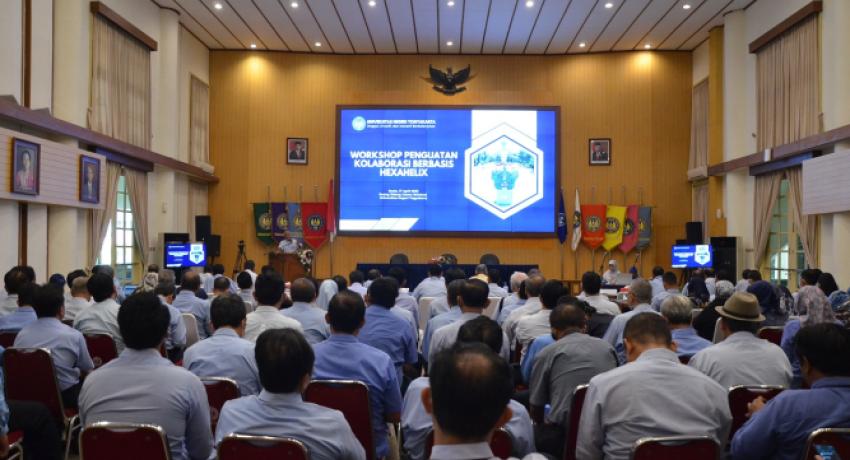To accelerate various new paradigms, UNY formed a task force following these aspects: entrepreneurship university, research and cyber university, and strengthening partner universities (Sisters-Enhancement University) by fostering corporate professionals in the form of responsibility, transparency, accountability, and fairness and equality. Therefore, hexahelix-based collaboration is needed, namely universities, government / local governments, school communities, the general public, the world of industry, the world of work and business, and the mass media. The Vice Rector said this for Research, Cooperation, Information System, and Entrepreneurship of UNY, Prof. Margana, in the Workshop on Strengthening Hexahelix-Based Collaboration at UNY, Monday (17/4).
School communities mostly dominate the domestic cooperation of UNY, while universities dominate foreign collaboration. "In the field of matching funds in 2023, UNY received 6.2 billion Rupiah from 12 teams in batch 1; last year, UNY received 3.2 billion Rupiah from 15 teams," said Margana. Therefore, it is necessary to accelerate cooperation by mapping the potential of study programs and existing opportunities, mapping the form of cooperation activities, initiating collaboration with potential partners, and implementing and monitoring/evaluating cooperation.
Head of the UNY World Class University Team, Prof. M. Bruri Triyono, explained that ranking towards a world-class university is essential because ranking has been proven to significantly help maintain and build the position and reputation of the institution. New students, cooperation reputation, and graduate employment requirements are closely related to institutional branding. University rankings can influence national and international partnerships and collaborations. "University rankings can also increase the willingness of potential partners to have relationships and support membership in academic or professional associations," he said. Databases for critical decisions are trusted sources to help promote reliable national higher education data collection and publication.
Executive Staff of Vice-Rector for Research, Cooperation, Information System, and Entrepreneurship UNY Dr. Nunik Sugesti said that until now, UNY has 130 cooperation documents consisting of 36 MoUs, 12 MoAs, and 82 IAs. "The documents include 19 international cooperation and 111 domestic cooperation," she said. Nunik precisely mapped the potential for cooperation that UNY can carry out. Among them are several schools and universities in Thailand and pioneering collaboration with partners from countries such as China, the United States, Australia, Saudi Arabia, the Philippines, Taiwan, and Timor Leste. In addition to foreign partners, UNY also opens its arms to cooperate with domestic partners. On this occasion, I Made Andi Arsana, Ph.D Head of the International Office of UGM (2014-2023) shares his experience establishing partnerships between UGM and domestic and international institutions.





